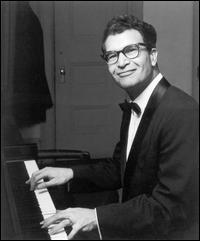| B i o g r a p h y |
 Dave Brubeck
(born December 6, 1920 in Concord, California) is an American jazz
pianist who wrote a number of jazz standards, including 'In Your Own
Sweet Way' and 'The Duke.' Brubeck's style ranges from refined to
bombastic, showing both his mother's attempts at classical training and
his improvisational skills. Much of his music makes use of unusual time
signatures; his long-time musical partner, alto saxophonist Paul
Desmond, wrote what is arguably the quartet's most famous song, 'Take
Five' (which is in 5/4 time). Brubeck experimented with time signatures
through much of his career, recording 'Pick Up Sticks' in 6/4,
'Unsquare Dance' in 7/4, and 'Blue Rondo A La Turk' in 9/8, an
experimentation begun with his attempts to put music to the odd rhythms
generated by various machines around him on his parents' cattle ranch
in a small town in the western United States. 'Blue Rondo A La Turk' is
a play on Mozart's 'Rondo alla Turca', and the 9/8 metre of traditional
Turkish music, the country in which the band was touring when the tune
was written.
Dave Brubeck
(born December 6, 1920 in Concord, California) is an American jazz
pianist who wrote a number of jazz standards, including 'In Your Own
Sweet Way' and 'The Duke.' Brubeck's style ranges from refined to
bombastic, showing both his mother's attempts at classical training and
his improvisational skills. Much of his music makes use of unusual time
signatures; his long-time musical partner, alto saxophonist Paul
Desmond, wrote what is arguably the quartet's most famous song, 'Take
Five' (which is in 5/4 time). Brubeck experimented with time signatures
through much of his career, recording 'Pick Up Sticks' in 6/4,
'Unsquare Dance' in 7/4, and 'Blue Rondo A La Turk' in 9/8, an
experimentation begun with his attempts to put music to the odd rhythms
generated by various machines around him on his parents' cattle ranch
in a small town in the western United States. 'Blue Rondo A La Turk' is
a play on Mozart's 'Rondo alla Turca', and the 9/8 metre of traditional
Turkish music, the country in which the band was touring when the tune
was written.
Brubeck's mother studied piano in England and intended to become a
concert pianist; at home she taught piano for extra money. Brubeck was
not particularly interested in learning by any certain method, but
preferred to create his own melodies; and so he avoided learning to
read sheet music. In college Brubeck was nearly expelled when one of
his professors discovered that he could not read sheet music. Several
of his professors came forward arguing for his ability with
counterpoint and harmony, but the school was still afraid that it would
cause a scandal, and only agreed to let Brubeck graduate once Brubeck
promised never to teach piano.
After graduating from the University of the Pacific in 1942, Brubeck
was drafted into the army and served overseas in George Patton's Third
Army during the Battle of the Bulge. He played in a band, quickly
integrating it and gaining both popularity and deference. He returned
to college after serving nearly 4 years in the army, this time
attending Mills College and studying under Darius Milhaud, who
encouraged him to study fugue and orchestration but not classical
piano. (Oddly enough, most critics consider Brubeck something of a
classical pianist playing jazz.)
After completing his studies under Milhaud, Brubeck started an octet
including Cal Tjader and Paul Desmond. The octet was highly
experimental, made few recordings, and got even fewer paying jobs. A
bit discouraged, Brubeck started a trio with two of the members, not
including Desmond, who had a gig of his own, and spent several years
playing nothing but jazz standards. Brubeck then formed The Dave
Brubeck Quartet in 1951, which consisted of Joe Dodge on drums, Bob
Bates on bass, Paul Desmond on saxophone, and of course Brubeck on
piano. In the mid-1950s Bates and Dodge were respectively replaced by
Eugene Wright and Joe Morello. Eugene Wright is African-American; in
the late 1950s Brubeck cancelled many concerts because the club owners
wanted him to bring a different bassist. He also cancelled a television
appearance when he found out that the venue intended to keep Wright
off-camera.
In 1959 the Dave Brubeck Quartet released Time Out, an album their
label was enthusiastic about but nonetheless hesitant to release. The
album contained all original compositions, almost none of which were in
common time. Nonetheless, on the strength of these unusual time
signatures (the album included 'Take Five', 'Blue Rondo A La Turk', and
'Pick Up Sticks'), it quickly went platinum. The quartet followed up
its success with several more albums in the same vein, including Time
Further Out (1961), Time in Outer Space, and Time Changes. These albums
were also known for using contemporary paintings as cover art,
featuring the work of Neil Fujita on Time Out, Joan Miró on Time
Further Out, Franz Kline on Time in Outer Space, and Sam Francis on
Time Changes. A high point for the group was their classic 1963 live
album At Carnegie Hall, described by critic Richard Palmer as 'arguably
Dave Brubeck's greatest concert'.
The Dave Brubeck Quartet broke up in 1967 except for a 25th anniversary reunion in 1976; Brubeck continued playing with Desmond and then began recording with Gerry Mulligan. Desmond died in 1977 and left everything, including residuals and the immense royalties for 'Take Five', to the American Red Cross. Mulligan and Brubeck recorded together for six years and then Brubeck formed another group with Jerry Bergonzi on saxophone, and three of his sons, Dan, Darius, and Chris, on drums, bass, and keyboards. Brubeck continues to write new works, including orchestrations and ballet scores, and tours about 80 cities each year, usually 20 of them in Europe in the spring. In recent years his quartet has included alto saxophonist Bobby Militello, bassist Alec Dankworth (who replaced Jack Six), and drummer Randy Jones.
Official Site: dave-brubeck.com